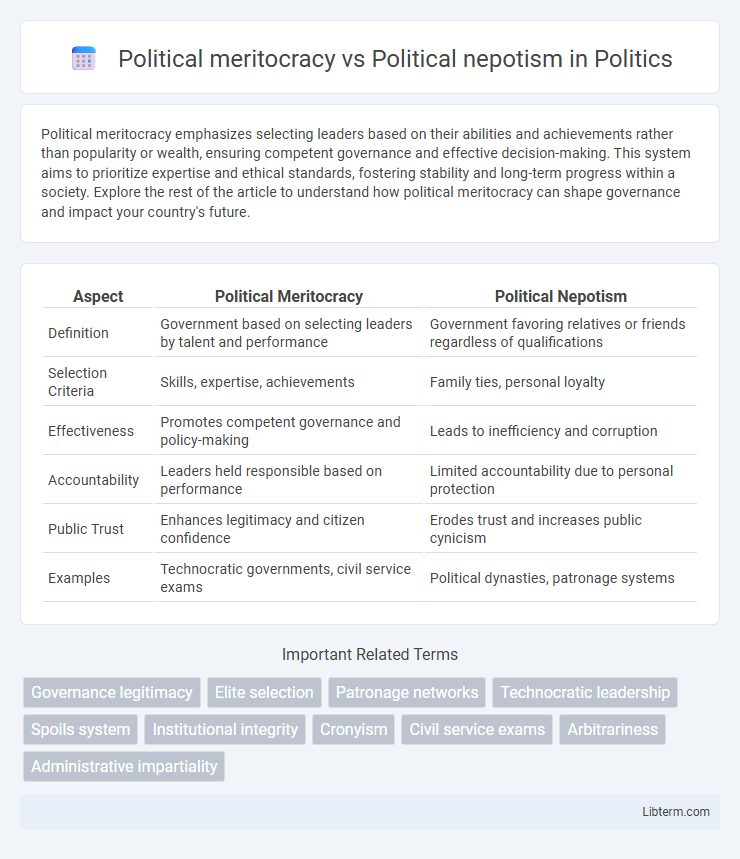Political meritocracy emphasizes selecting leaders based on their abilities and achievements rather than popularity or wealth, ensuring competent governance and effective decision-making. This system aims to prioritize expertise and ethical standards, fostering stability and long-term progress within a society. Explore the rest of the article to understand how political meritocracy can shape governance and impact your country's future.
Table of Comparison
| Aspect | Political Meritocracy | Political Nepotism |
|---|---|---|
| Definition | Government based on selecting leaders by talent and performance | Government favoring relatives or friends regardless of qualifications |
| Selection Criteria | Skills, expertise, achievements | Family ties, personal loyalty |
| Effectiveness | Promotes competent governance and policy-making | Leads to inefficiency and corruption |
| Accountability | Leaders held responsible based on performance | Limited accountability due to personal protection |
| Public Trust | Enhances legitimacy and citizen confidence | Erodes trust and increases public cynicism |
| Examples | Technocratic governments, civil service exams | Political dynasties, patronage systems |
Defining Political Meritocracy
Political meritocracy prioritizes selecting leaders based on skills, qualifications, and demonstrated competence, ensuring governance is driven by expertise and effective decision-making. This system contrasts sharply with political nepotism, where appointments and power distribution are influenced by familial or personal relationships rather than merit. Emphasizing meritocratic principles enhances transparency, accountability, and the overall efficiency of political institutions.
Understanding Political Nepotism
Political nepotism occurs when individuals in power appoint or favor relatives and close associates, undermining merit-based governance and leading to inefficiency and corruption. Understanding political nepotism involves examining how favoritism distorts policy decisions and weakens institutional integrity by prioritizing loyalty over competence. This practice often results in restricted political competition and diminished public trust in governmental institutions.
Historical Contexts of Meritocracy and Nepotism
Historical contexts reveal that political meritocracy, exemplified by Imperial China's civil service exams, prioritized competence and bureaucratic skill over birthright, enabling state efficiency and governance stability. In contrast, political nepotism, evident in Renaissance Italian city-states and medieval European monarchies, entrenched familial power through favoritism and patronage, often undermining institutional integrity and fueling corruption. These divergent systems shaped governance paradigms by either promoting qualified leadership or perpetuating dynastic control, influencing political legitimacy across centuries.
Core Principles: Merit-Based vs. Family-Based Governance
Political meritocracy emphasizes selecting leaders through competence, skills, and achievements, ensuring decisions are driven by expertise and objective evaluation. In contrast, political nepotism prioritizes family loyalty and kinship ties over qualifications, often resulting in inherited power and favoritism. Merit-based governance fosters accountability and innovation, whereas family-based governance risks perpetuating inefficiency and corruption.
Impacts on Government Efficiency and Integrity
Political meritocracy enhances government efficiency by promoting qualified individuals based on skills and performance, leading to effective policy implementation and innovation. In contrast, political nepotism often results in the appointment of less competent officials, undermining administrative effectiveness and fostering corruption. The integrity of governance is strengthened under meritocratic systems through accountability and transparency, while nepotism erodes public trust and encourages rent-seeking behaviors.
Political Meritocracy: Global Examples
Political meritocracy is exemplified by countries such as Singapore and China, where leadership positions are typically awarded based on expertise, qualifications, and proven competency rather than family ties. Singapore's rigorous civil service exams and continuous training ensure that government officials possess the skills necessary to enact effective policies and maintain stability. In China, the Communist Party emphasizes meritocratic principles through its structured promotion system within the party, evaluating cadres on performance metrics and educational background.
Political Nepotism: Notable Case Studies
Political nepotism undermines governance by prioritizing family ties over competence, often leading to corruption and inefficiency. Notable case studies include the Marcos regime in the Philippines, where familial favoritism entrenched authoritarian rule, and the Gandhi family in India, whose political dominance sparked debates on dynastic politics. In these examples, nepotism diminished meritocratic principles, weakening democratic institutions and public trust.
Social and Economic Consequences
Political meritocracy fosters efficient governance by promoting leaders based on competence and expertise, leading to sustainable economic growth and social equity. In contrast, political nepotism often results in corruption, misallocation of resources, and social polarization, undermining economic development and public trust. Empirical studies show meritocratic systems reduce income inequality and enhance social mobility, whereas nepotism perpetuates elite dominance and stagnates economic progress.
Public Perception and Trust in Leadership
Political meritocracy fosters public trust by emphasizing competence, qualifications, and proven performance in leadership roles, which aligns with citizens' expectations for effective governance. In contrast, political nepotism often erodes trust as it prioritizes familial ties over merit, leading to perceptions of corruption, favoritism, and inefficiency. Surveys and studies consistently reveal that electorates exhibit higher confidence in meritocratic systems where leadership is earned rather than inherited.
Strategies for Promoting Political Meritocracy
Implementing transparent and merit-based recruitment processes for political positions enhances accountability and effectiveness in governance. Establishing independent institutions to oversee candidate selection ensures decisions are based on qualifications and performance rather than familial connections. Investing in education and leadership development programs fosters a pool of competent individuals prepared to contribute to political decision-making.
Political meritocracy Infographic

 libterm.com
libterm.com